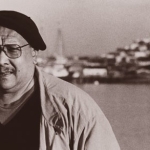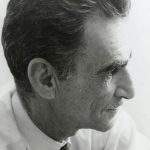Peace is the active presence of Justice.
The wrinkles on the brown face
of the carrying case
conform to the buttocks,
on which the streaks of water
from a five-gallon can
dribble on the tailfront
of the borrowed shirt
he would wear if he could
drain the pus from his swaddling
bandages, striations of skin
tunneling into the photograph.
This is no simple mug shot
of a runaway boy in a training
film, Soweto's pummeled wire,
though the turrets of light
glisten in smoke, the soft
coal hooding his platform
entrance, dull and quiet.
His father's miner's shoes
stand in puddles of polish,
the black soot baked
into images of brittle torso,
an inferno of bullets laid
out in a letter bomb,
the frontispiece of one sergeant-
major blackening his mustache.
On the drive to Evaton
a blank pass away from Sharpeville
where the freehold morgans
were bought by a black bishop
from Ontario, Canada, on a trek
northward from the Cape in 1908,
I speak to myself as the woman
riding in the backseat talks
of this day, her husband's
death, twenty-three years ago,
run over by an Afrikaner in the wrong
passing lane; the passbook on the shoulder
of the road leading to Evaton
is not the one I have in my hand,
and the photograph is not of my great-
grandfather, who set sail for Philadelphia
in the war year of 1916.
He did not want a reception, his letters
embarking on a platform at Queenstown
where his eloquence struck two Zulu warriors
pledged to die in the homelands
because they could not spin their own gold.
These threaded heads weigh down the ears
in design of the warrior, Shaka,
indifferent to the ruthless offerings
over the dead bodies of his wives,
childless in the campaigns with the British,
who sit on the ships of the indian Ocean
each kraal shuddering near the borders;
her lips turn in profile
to the dust rising over a road
where his house once stood;
one could think of the women
carrying firewood as an etching
in remembrance to the silence,
commencing at Sharpeville,
but this is Evaton, where he would come
from across the galleyship of spears
turning in his robes to a bookmark;
it is a good book, the picture of words
in the gloss of a photograph,
the burned image of the man who wears
this image on the tongue of a child,
who might hold my hand
as we walk in late afternoon
into the predestined sun.
The press of wrinkles on the blanketed
voice of the man who took the train
from Johannesburg
is flattened in Cape Town,
and the history of this book
is on a trestle where Gandhi
worshipped in Natal,
and the Zulu lullaby
I cannot sing in Bantu
is this song in the body
of a passbook
and the book passes
into a shirt
and the back that wears it.



















Comment form: